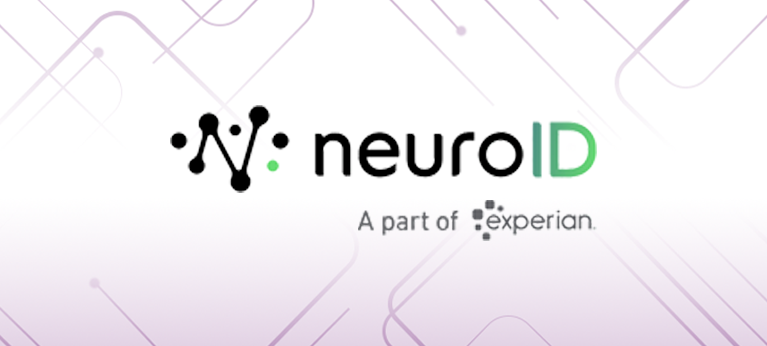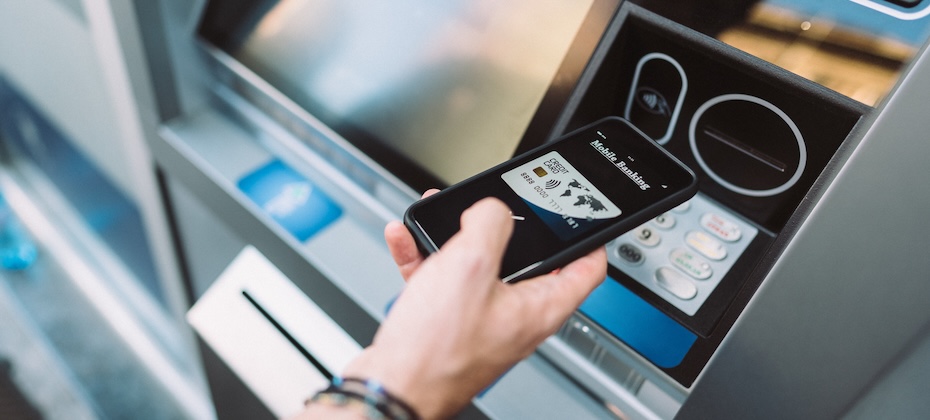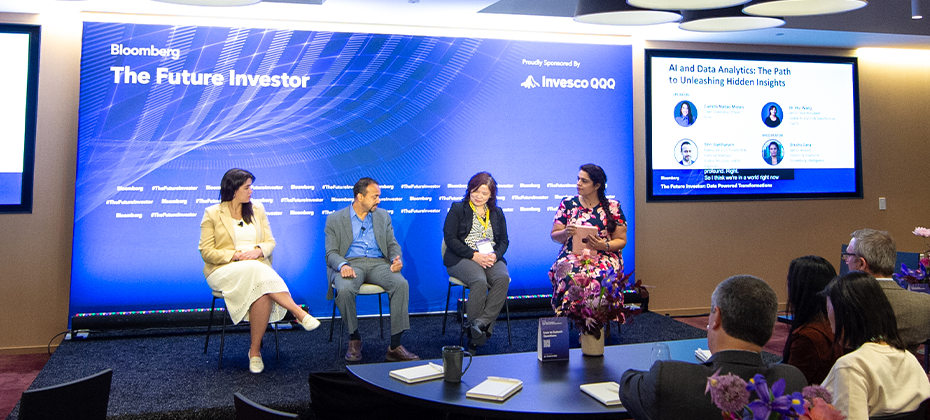Innovation
At Experian, we are continually innovating and using technology to find solutions to global issues, modernize the financial services industry and increase financial access for all. Read about our latest innovation news below:

Fraudsters are opportunistic. They are capitalizing on using new technology to create more sophisticated fraud schemes, underscoring the importance and urgency of prioritizing fraud prevention strategies. In fact, the FTC reported that consumers lost more than $10 billion to fraud in 2023, the first time losses have ever been so high. As a leader in the fraud prevention and identity verification space, we’re dedicated to helping clients stay ahead of evolving fraud trends and challenges. To that end, today we released the findings of our 9th annual Experian Identity and Fraud Report, which provides an in-depth look at the current fraud landscape and the sentiments of both consumers and businesses. Some of the top findings include: Consumers’ top security concerns include: identity theft (84%) and stolen credit card information (80%), a 20% increase compared to 2023. Sixty-three percent of people say it is important for businesses to be able to recognize them online. Eighty-one percent of consumers say they’re more trusting of businesses that can accomplish easy and accurate identification. People want more types of identity recognition techniques used to verify their identities with physical analytics (71%), PINs sent to a mobile device (70%) and behavioral analytics (66%) evoking the highest sense of security for consumers. Companies recognize the importance of focusing on Gen AI, with 70% saying they expect AI fraud to be the second greatest challenge for their business. Despite AI fraud concerns, businesses ranked detecting and preventing Gen AI fraud and deepfakes as the 12th most important investment area behind prevention for legacy fraud types. With these fraud concerns in mind, companies need to review their current fraud tools and strategies, and look for opportunities to add to or change current approaches, to not only mitigate risk but also keep their customers safe while providing a positive experience. Businesses should work with a trusted partner who can help them implement a multilayered approach to identity verification and fraud prevention and help them meet consumer expectations. Experian offers a full suite of automated tools that harness data and analytics to prevent fraud and mitigate losses. We’re dedicated to empowering clients with the insights they need to make informed, data-driven decisions that safeguard their customers and reduce risk. Our recent acquisition of NeuroID, an industry leader in behavioral analytics, is a testament to this. To learn more about Experian’s fraud prevention solutions: please click here. To read Experian’s 2024 Identity and Fraud Report, please click here.

Amid the rise in usage of generative AI tools, companies across industries are looking for fraud detection strategies that enable them to combat sophisticated fraud schemes now and in the future. At Experian, we’re committed to ensuring our clients can make the most informed, data-driven decisions to protect the customers they serve while mitigating risk. To support this, today we’re excited to announce our acquisition of NeuroID – an industry leader in behavioral analytics. NeuroID combines the power of behavioral analytics with advanced device and network intelligence to create the first line of defense against malicious bots, bad actors, and fraud rings. This can help clients identify everything from identity theft to account takeover fraud from the very first interaction. NeuroID’s modern and frictionless capabilities amplify Experian’s fraud risk suite by providing a new layer of insight into digital behavioral signals and analytics observed for both new and returning users throughout the customer lifecycle. Together with NeuroID, we’re excited to build new blended offerings that detect risk but also empower businesses to confidently navigate the online landscape and trust in their transactions. Experian has a long legacy of providing award-winning fraud and identity solutions to protect companies and their customers. Last year alone, our identity verification and fraud prevention solutions helped clients avoid an estimated $15 billion in fraud losses globally. Adding NeuroID to the Experian family is another step in our commitment to continuous innovation in fighting fraud and helping clients and consumers keep pace with the evolving identity landscape. NeuroID’s behavioral analytics solutions are available now through CrossCore® on the Experian Ascend Technology Platform™ as a key fraud-detection capability. With NeuroID seamlessly integrated into Experian, clients can use one service provider to proactively monitor and analyze a user’s real-time digital behavior. To learn more, click here.

Amid some of the financial challenges that underserved communities experience, members across the financial services community remain committed to championing initiatives and programs that drive greater financial inclusion. In fact, collaboration has led to the inclusion of non-debt related payment information on consumers’ credit profiles, as well as digital services that make it easier to manage money. These efforts have helped to broaden access to fair and affordable financial resources for more individuals. While significant progress has been made, there is still more work to do. However, some of the misconceptions and myths about the financial services community are hindering further advancement. Debunking these myths will accelerate progress by building trust between the financial services community and consumers. Person withdrawing money from ATM contactless Myth #1: “Financial institutions have no interest in underserved consumers or credit invisibles.” The truth is, banks and credit unions want to say “yes” to more prospective borrowers, including individuals and families from underserved communities. Beyond being the right thing to do, it’s an opportunity to potentially build lifelong relationships with a relatively untapped market. A show of good faith to communities who have largely been ignored by the financial system could lead to customer loyalty that may extend to their family and friends. That’s why participants across the financial ecosystem have been proponents of including expanded data sources—such as on-time telecom, utility and video streaming service payments—on to consumer credit reports, as well as exploring other Fair Credit Reporting Act (FCRA)-regulated data sources, including payment data on short-term small dollar loans and expanded public records data. Making this data more accessible to lenders provides a more comprehensive view of a consumer’s ability and willingness to repay outstanding debt—an actionable solution to extending credit to consumers without lenders taking on additional risk. Myth #2: “There is a lack of trustworthy financial education resources.” The financial services community and affiliated organizations recognize that empowering people with financial knowledge and skillset are critical to consumers’ financial success. In fact, banks and credit unions are partnering with nonprofits and non-governmental organizations to better understand the unique challenges and opportunities within specific communities and provide relevant tools and resources. For example, Experian’s B.A.L.L. for Life (Be A Legacy Leader) program, launched in partnership with the National Urban League, serves as a catalyst for engaging with Black communities and low-income youth through live events and digital financial education. Subject matter experts, professional athletes, celebrities, and other influencers share their experiences and expertise, covering topics such as banking, credit, financial management and investing. In addition, to help people improve their financial management, Experian partners with the National Foundation for Credit Counseling (NFCC). The NFCC connects consumers with certified financial counselors to help them address various pain points, including debt management, homeownership, student loans or small business cash flow issues. Myth #3: “Underserved communities have few opportunities to build credit and enter the mainstream financial system.” People from underserved communities, as well as younger consumers and recent immigrants are often excluded from the mainstream financial system because they lack an extensive credit history. Historically, it’s created a vicious cycle; in order to get credit, you have to have credit. Fortunately, there has been a sea change in innovative solutions to address the specific needs of these populations. These include new credit scoring models and microfinancing which provide financial services to individuals who may have been excluded from traditional banking systems. In addition, by incorporating expanded data sources, such as telecom, utility and residential rental payments onto credit reports, lenders have more visibility into consumers who may have been excluded by traditional credit scoring methods.These programs help individuals and families from underserved communities establish and build a credit history that could enable loans, or the ability to rent an apartment or open their dream business. An example is Experian Boost®, a free feature that allows Experian members to contribute their history of making utility, cellphone, insurance, residential rent and video streaming service payments directly into their Experian credit profile. By incorporating nontraditional credit data like paying utility bills on time, online banking transactions, rental payments and verified income data, more people can establish a credit profile that can potentially qualify them for a loan. More Inclusion, Fewer Myths It’s encouraging that community organizations and banks are beginning to see the economic and social benefits of aligning on financial literacy and inclusion. As more initiatives come online, underserved populations will be able to establish a better financial foundation. Then, we can declare the myths to be history.

Generative AI is not just a technological advancement; it is the driving force behind a revolution in the financial services industry. At the recent VentureBeat Transform conference, financial industry leaders gathered to discuss the transformative potential of Generative AI. Among the panelists was Shri Santhanam, Executive Vice President and General Manager of Software, Platforms, and AI at Experian North America. The session, titled Generative AI: Crafting Smart Solutions for Financial Services, explored how generative AI is revolutionizing the finance sector by crafting intelligent solutions to address unique industry challenges. Santhanam highlighted the significant digital transformation within financial services, driven by AI and machine learning. "Generative AI is having a profound impact on many industries, including financial services," Santhanam stated. He emphasized that AI contributes to better financial inclusion, improved risk assessment, and enhanced customer experiences. Experian's Commitment to AI Innovation Experian has been at the forefront of AI integration, leveraging advanced technologies to drive productivity and enhance customer engagement. A prime example of this commitment is the Ascend Technology Platform, which democratizes access to AI tools for clients and Experian developers. Santhanam shared insights into Experian's strategic approach to AI adoption. "We invested early in production scale and are very careful about which projects to sponsor for go-to-market. These projects must pass a bar that includes strategic alignment, customization, and regulatory compliance," he explained. Real-World Applications and Future Directions Generative AI is poised to produce significant impacts, particularly in underwriting models, pattern recognition, and automation. Santhanam noted that Experian has made considerable strides in AI integration over the past 12 to 18 months, enhancing coding and engineering productivity among the extensive team of over 2,000 engineers. Additionally, AI-powered dialogues have elevated customer engagement, demonstrating the practical benefits of these technologies. One of the standout features of Experian's approach is the balance between innovation and regulation. Santhanam emphasized the importance of breaking down silos and fostering collaboration between risk and technology teams to navigate the complexities of AI adoption in highly regulated environments. Looking Forward Experian's dedication to responsible AI is evident in its establishment of an AI academy to accelerate upskilling and promote grassroots innovation. By encouraging employees to engage with generative AI and share their successes, Experian fosters a culture of continuous learning and experimentation. As AI continues to evolve, Experian remains committed to adapting to regulatory changes while ensuring fairness, transparency, and non-discrimination in their AI applications. We see tremendous opportunities in enhancing customer engagement, expanding financial inclusion, and streamlining processes through AI. In conclusion, Shri Santhanam's participation in the VentureBeat Transform panel underscores Experian's leadership in leveraging Generative AI to drive innovation and deliver tangible benefits to businesses and consumers. The Ascend Technology Platform exemplifies Experian's commitment to harnessing the power of AI responsibly, setting a benchmark for the financial services industry.

The challenge for financial institutions today is to understand the individuals who are applying for credit and to provide everyone with equitable opportunity to gain access to credit, provided they are an acceptable risk. In my current role as CEO of Experian Software Solutions, I am often reminded of my own journey as an immigrant to America who had to navigate the tests and complexities of establishing my financial identity and eligibility. I understand firsthand how inefficiencies caused in part by fragmented software systems have led to inflated costs, extended timelines, and elevated risks for financial institutions around the globe. Not to mention the profound impact this approach can have on consumers. At Experian, we recognize the need for change, which is why we developed Experian Ascend Platform™— an innovative solution designed to integrate critical functionalities seamlessly. Already, more than 1,500 clients globally are leveraging the platform, processing millions of transactions daily. Today, we’re unveiling new enhancements to the platform that bring together software tools for analytics, credit decisioning and fraud into a single interface — simplifying the deployment of analytical models and enabling businesses to optimize their practices more frequently, achieving greater efficacy with lower investment of time and money. Why does this matter? Well, consider the challenges faced by businesses, especially in the financial sector, when it comes to integrating various software solutions. “Complicated spaghetti” is what executives from some of the largest global banks have called it in conversations with me. Historically, achieving a synchronized experience across different tools and applications has been elusive to the industry. This fragmented approach not only stretches timelines unnecessarily but also raises security concerns and increases operational challenges and costs. Our enhanced platform addresses these pain points head-on. It dramatically reduces time to value while eliminating compliance risks and offers streamlined access to Experian's suite of integrated solutions and tools through a single sign-on and user-friendly, harmonized user interface. Moreover, it leverages generative AI to facilitate seamless automation, modernization, and efficiency across organizations of all sizes and experience levels without compromising human checks and controls. Our platform brings together worldclass Experian data, partner data and our clients' data with the software in one environment. There is no other platform on the market that offers the level of sophisticated integrations we do or that can "turn on" new solutions as quickly. To put it simply, it's a revolution for this industry. By combining analytics, decision-making, and fraud detection into a single platform, we're simplifying operations, enhancing security, and accelerating time to value for financial institutions worldwide. Let me give you an example. Lendr, a specialized fintech offering financing solutions for small businesses, has experienced firsthand the platform's transformative impact on agility, competitiveness, and informed decision-making. In fact, over the last year, the platform has already helped Lendr double their business. Our journey to developing the platform wasn't easy. It has required years of strategic collaboration with many of our most sophisticated clients, significant investments in technology, and a relentless pursuit of innovation. But the result is a platform that is revolutionizing the financial services industry and paving the way for a more inclusive, secure, and seamless financial future for all. As we continue this journey of transformation, I'm excited about the possibilities that lie ahead. With our integrated platform, we’re not just transforming the industry—we're empowering individuals and institutions to thrive.

We’ve reached a meaningful milestone with the launch of Experian Cashflow Attributes™. Now, lenders can tap into over 900 income, cashflow and affordability attributes from Experian across the customer lifecycle – which can provide a more accurate view of consumers’ financial health.

Innovation isn't just about creating the next big thing. It can solve problems, improve lives, and help businesses stay ahead in a rapidly changing world. So, what drives innovation? It starts with a culture of collaboration and entrepreneurship that inspires creativity. Our North America headquarters are in the center of Orange County, a community that fosters an environment where ideas flourish and partnerships thrive. For years, we’ve worked with Octane, a local non-profit organization focused on driving innovation and growth by connecting people, resources and capital to build a better future. Experian is committed to disrupting the status quo and supporting an environment where creativity can be unleashed. Armed with the power of data and the latest technologies, such as generative AI, we believe we can help better financial outcomes for the consumers and businesses we serve. I recently gave a keynote at Octane’s annual Tech Innovation Forum during OC Innovation Week, exploring how businesses can unleash creativity through the use of generative AI and highlighting five tenets companies can consider for the responsible use of generative AI, including: Engage with purpose: It’s important that companies identify their purpose in using the technology and how it can positively impact their business, employees and customers. They should start with creating a plan, including deciding who will be using AI, what jobs need to be done, what guidelines need to be set and a review process. Elevate creativity and drive automation: Businesses should harness AI to automate processes that are mundane or labor-intensive to enable employees to focus more of their time and energy on creativity. Excite, educate, and train employees: To ensure all employees understand the potential of generative AI, businesses should prioritize education and training for all employees from the start. This includes finding evangelists of the new technology within the company to stay up-to-date on the latest news and get teams excited about the possibilities. Ensure ethical, compliant and responsible use: In addition to employee trainings, it’s important to set up a group of leaders, such as a risk council, that can handle ongoing opportunities and risks and codify guidelines on the ethical usage of AI. Embrace change and be agile: With any new technology, companies need to be agile and ready to adapt to whatever changes may come. It’s important to foster a culture of learning to constantly evolve the generative AI landscape for the company and its clients. Innovation can fuel economic growth, drive progress, and shape the future. We’re dedicated to fostering a culture of innovation and collaboration that creates opportunities for generations to come. Photo by © Octane/Michael Baker

In a panel discussion at a Bloomberg-hosted panel titled "AI and Data Analytics: The Path to Unleashing Hidden Insights," Diksha Gera, a Senior Analyst at Bloomberg Intelligence, moderated a session that included key insights from Shri Santhanam, Executive Vice President and General Manager of Software, Platforms, and AI at Experian. Santhanam shared his thoughts on the transformative influence of generative AI (GenAI) within the financial sector, underlining its potential to revolutionize traditional practices. Enhancing Core Processes Santhanam illustrated how GenAI is altering the landscape of financial institutions. By automating intricate tasks, improving customer interactions, and expediting product development, this technology is pivotal. It transforms time-intensive tasks into more efficient processes, significantly enhancing productivity. This shift allows employees to focus on more strategic, higher-value work, thereby boosting the overall efficiency of financial institutions. Managing Risks and Ensuring Compliance With the adoption of GenAI comes a host of inherent risks—privacy concerns, data integrity issues, and challenges in regulatory compliance. Santhanam underscored the critical need to balance these innovative strides with stringent security measures that protect customer data and comply with existing regulations. The commitment to aligning practices with regulatory standards and ethical guidelines is paramount as the financial sector continues to integrate AI into its core operations. Governance and Collaboration Effective governance is essential for the successful deployment of GenAI in finance. Santhanam advocated for a collaborative approach that includes risk management, legal, and technical teams. The development of robust governance frameworks supports ethical and compliant AI applications, which are crucial for fostering responsible innovation within the industry. The Future of GenAI Looking forward, Santhanam pointed to several trends that are shaping the future of GenAI in the financial sector. These include pressures to reduce costs, increased demand for personalization, and the necessity for user-friendly interfaces. GenAI is set to play a key role in delivering personalized, efficient, and accessible financial services that respond to the evolving needs of customers. These insightful discussions, spearheaded by industry leaders like Bloomberg and moderated by experts such as Diksha Gera, emphasize Experian's leading role in navigating the potential and challenges of AI in financial services. The journey towards a more innovative and inclusive financial ecosystem is well underway, driven by the transformative capabilities of GenAI.

Recent technological advancements are ushering in a new era of innovation for businesses and consumers but can also help perpetuate fraud. Today we released our annual Future of Fraud Forecast, highlighting five fraud threats that businesses and consumers should be wary of this year, which include: Generative AI accelerates DIY fraud: The explosive popularity of generative AI has brought many benefits, but it’s also made fraud more accessible. Experian predicts fraudsters will use generative AI to accelerate “do-it-yourself” fraud with a wide range of deepfake content, such as emails, voice and video as well as code creation to set up scam websites and perpetuate online attacks. Fraudsters may also use generative AI to socially engineer “proof of life” schemes. Using stolen identities, fraudsters will leverage generative AI to create fake identities on social media. They can then interact online with these new profiles that look like a real consumer. This could dramatically increase the number of fraud attacks. To safeguard customers, companies will likely have to utilize multilayered fraud prevention solutions that “fight AI with AI.” Branches are cool again: Although there’s been a substantial migration to digital lending experiences, many consumers are heading in-person to bank branches to open new accounts or get financial advice. Consumers are doing this as they want to feel safer and think they’re avoiding online security risks by being in-person. When it comes to verifying identities at the branch, there can be human error or oversight that can happen in-person. According to an Experian report, 85% of consumers report physical biometrics as the most trusted and secure authentication method they’ve recently encountered, but the measure is only currently used by 32% of businesses to detect and protect against fraud. Experian forecasts that lenders will introduce more digital identity verification steps, such as physical biometrics, at branches for in-person account openings to protect legitimate customers and mitigate losses. Retailers hit with empty returns: With a rise in online shopping, fraudsters have found creative ways to scam some retailers and small businesses. The customer says they’re returning their purchased item but when the business receives the box, it’s empty. The customer then says they returned the product and it must have gotten lost in the mail. Experian predicts that more criminals will use this method to keep merchandise in 2024, leaving businesses with lost goods and revenue. Synthetic identity fraud will surge: During the pandemic, many fraudsters created synthetic identities but then quickly found easier methods to steal funds through various aid programs. Though they may have been dormant, these synthetic identities now have a few years of history. Experian predicts this will make it easier to elude detection — leading to fraudsters using those dormant accounts to “bust out” and steal funds over the next year. Businesses will need to collaborate more closely than ever with their fraud-prevention partners to review their current portfolios for synthetic identity accounts. Fraudsters expand into cause-related and investment deception: From fake GoFundMe campaigns, social media giveaways, investment opportunities and text fraud, fraudsters are employing new methods that strike an emotional response from consumers with cause-related asks or too-good-to-be-real offers to gain access to consumers’ vital, personal information. Experian predicts that these deceptive cause-related methods will surge in 2024 and beyond. To avoid becoming victims, consumers will have to be extremely cautious and confirm these opportunities, charities or texts are from the intended party before interacting with them. To mitigate fraud in 2024, businesses need to work with a trusted partner to implement a multilayered approach to identity verification and fraud prevention. Experian offers a full suite of automated tools that harness data and analytics to detect and prevent fraud. Learn more about Experian’s fraud prevention offerings here and register for our webinar for a deeper dive into these five fraud predictions and other emerging fraud trends.